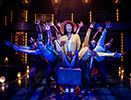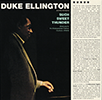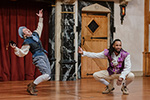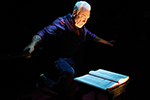Et tu Booth
John Wilkes Booth Saw Himself as Brutus;
What Does That Say About Brutus?
 John Wilkes Booth likened himself to Brutus in WIlliam Shakespeare's play Julius Caesar who would rid the United States of its own tyrant, Abraham Lincoln. Turning this emulation around gives us a perspective of Brutus that is far from that of the tragic hero. When both are seen as vainglorious scoundrels, that both would share the same consequences was neither irony nor fate: it was ordained. For the complete commentary click here.
John Wilkes Booth likened himself to Brutus in WIlliam Shakespeare's play Julius Caesar who would rid the United States of its own tyrant, Abraham Lincoln. Turning this emulation around gives us a perspective of Brutus that is far from that of the tragic hero. When both are seen as vainglorious scoundrels, that both would share the same consequences was neither irony nor fate: it was ordained. For the complete commentary click here.
On Beckett
On Bill Irwin On Beckett
 Bill Irwin is doing his one-actor show On Beckett at the Shakespeare Theatre Company's Klein Theatre, comprising a bit more than 80 minutes of Irwin talking about Samuel Becket, the Irish playwright who wrote his prose and plays in French, but this play is maybe more about Irwin, the veteran Tony Award-winning actor who describes a real love-hate relationship with Becket.… To continue my review, click here, and good luck.
Bill Irwin is doing his one-actor show On Beckett at the Shakespeare Theatre Company's Klein Theatre, comprising a bit more than 80 minutes of Irwin talking about Samuel Becket, the Irish playwright who wrote his prose and plays in French, but this play is maybe more about Irwin, the veteran Tony Award-winning actor who describes a real love-hate relationship with Becket.… To continue my review, click here, and good luck.
Antony and Cleopatra
Beating Hearts Inside Shakespeare's Text
 Sex and violence is a given for a play titled Antony and Cleopatra featuring the collision between the warrior order of the Roman Empire and the seductive exotica of Dynastic Egypt. The Synetic Theatre "Wordless Shakespeare" version of the play has plenty of both in its athletic fight and seductive courtship scenes. It's the ingenious casting of the two actor dancers playing the leads that lift this visual vehicle into a personality-driven drama of love and hate, power and despair, loyalty and treachery. For the complete review click here.
Sex and violence is a given for a play titled Antony and Cleopatra featuring the collision between the warrior order of the Roman Empire and the seductive exotica of Dynastic Egypt. The Synetic Theatre "Wordless Shakespeare" version of the play has plenty of both in its athletic fight and seductive courtship scenes. It's the ingenious casting of the two actor dancers playing the leads that lift this visual vehicle into a personality-driven drama of love and hate, power and despair, loyalty and treachery. For the complete review click here.
A Christmas Carol
From the Mouth of Dickens
and His Many Creations
 Of all the characters Angela Iannone played in Charles Dicken's "A Christmas Carol" at the American Shakespeare Center's Blackfriars Playhouse—that number includes Jacob Marley's Ghost, Fred, Bob Cratchit, Mrs. Cratchit, the countless Cratchit children but especially Tiny Tim, Mr. Fezziwig, Belle, two charity solicitors, the charwoman, the laundress, the undertaker, the boy as big as the prize turkey in the Poulterer's shop, the Ghosts of Christmas Past, Present, and Yet To Come, and Ebeneezer Scrooge—the most important was Charles Dickens himself. For it was Iannone as Dickens who arrived on the Blackfriars Playhouse stage in Staunton, Virginia, for a one-presentation-only of his Christmas-themed story.For the rest of the review and its significance on Thanksgiving Day, click here.
Of all the characters Angela Iannone played in Charles Dicken's "A Christmas Carol" at the American Shakespeare Center's Blackfriars Playhouse—that number includes Jacob Marley's Ghost, Fred, Bob Cratchit, Mrs. Cratchit, the countless Cratchit children but especially Tiny Tim, Mr. Fezziwig, Belle, two charity solicitors, the charwoman, the laundress, the undertaker, the boy as big as the prize turkey in the Poulterer's shop, the Ghosts of Christmas Past, Present, and Yet To Come, and Ebeneezer Scrooge—the most important was Charles Dickens himself. For it was Iannone as Dickens who arrived on the Blackfriars Playhouse stage in Staunton, Virginia, for a one-presentation-only of his Christmas-themed story.For the rest of the review and its significance on Thanksgiving Day, click here.
Play on!
And Some Find Greatness
Between the Lines
 William Shakespeare and Duke Ellington were collaborating long before Sheldon Epps and Cheryl L. West brought them together for Play On!, a musical about a love triangle involving a Duke, a regal Lady, and a woman disguised as a man as their go-between messenger. The musical transplants Shakespeare’s Twelfth Night to the Harlem Renaissance (1920s–1930s) with a score comprising Ellington tunes, andin the hands of director Lili-Anne Brown and the feet, legs, and voices—oh! the voices—of the cast performing the musical at Signature Theatre in Arlington, Virginia, recently closed out a mostly sold-out run last weekend. Maybe for Shakespeare purists it won’t mean a thing if it ain’t Bard writing, but aside from being fun stuff and great Ellington music, Play On! captures and even enhances some of the universal humanism Twelfth Night explores. For the complete review, click here.
William Shakespeare and Duke Ellington were collaborating long before Sheldon Epps and Cheryl L. West brought them together for Play On!, a musical about a love triangle involving a Duke, a regal Lady, and a woman disguised as a man as their go-between messenger. The musical transplants Shakespeare’s Twelfth Night to the Harlem Renaissance (1920s–1930s) with a score comprising Ellington tunes, andin the hands of director Lili-Anne Brown and the feet, legs, and voices—oh! the voices—of the cast performing the musical at Signature Theatre in Arlington, Virginia, recently closed out a mostly sold-out run last weekend. Maybe for Shakespeare purists it won’t mean a thing if it ain’t Bard writing, but aside from being fun stuff and great Ellington music, Play On! captures and even enhances some of the universal humanism Twelfth Night explores. For the complete review, click here.
With sidebar:
Such Sweet Thunder
The Duke Finds Kindred Spirit in The Bard
 In 1956, the four-year-old Stratford, Canada, Shakespeare Festival invited Duke Ellington and his orchestra to perform a series of concerts. Ellington's interaction with the festival's Shakespeare practitioners inspired him and his orchestrator, Billy Strayhorn, to compose "Such Sweet Thunder," a suite of 12 songs based on Shakespeare's characters and the Bard himself. Ellington premiered the piece the following year. Ellington certainly knew Shakespeare, based on his insights in literally playing the playwright's characters. For the full review, click here.
In 1956, the four-year-old Stratford, Canada, Shakespeare Festival invited Duke Ellington and his orchestra to perform a series of concerts. Ellington's interaction with the festival's Shakespeare practitioners inspired him and his orchestrator, Billy Strayhorn, to compose "Such Sweet Thunder," a suite of 12 songs based on Shakespeare's characters and the Bard himself. Ellington premiered the piece the following year. Ellington certainly knew Shakespeare, based on his insights in literally playing the playwright's characters. For the full review, click here.
Merry Wives
Today's Merry Wives; a Timeless Falstaff
 It plays like the premiere of a new reality series franchise. Merry Wives (of Harlem) stars Anne Page, Johnny Falstaff, and the merry wives, Madam Nkechi Ford and Madam Ekue Page, streaming now at the Shakespeare Theatre Company's Harman Hall in Washington, D.C. Sounds ridiculous? So is the play it's built on, William Shakespeare's The Merry Wive's of Windsor. As adaptations of Shakespeare’s works go, Jocelyn Bioh’s is one of the most thoroughly Shakespearean transfers to the 21st century I've seen of any of the Bard’s 16th century plays. A big reason: Shakespeare’s great comic creation, Sir John Falstaff, gets a thoroughly modern rendition in the performance of Jacob Ming-Trent, destined to be one of the most indelible Falstaff's romping through my memories to the end of my time on this earth. For the full review, click here.
It plays like the premiere of a new reality series franchise. Merry Wives (of Harlem) stars Anne Page, Johnny Falstaff, and the merry wives, Madam Nkechi Ford and Madam Ekue Page, streaming now at the Shakespeare Theatre Company's Harman Hall in Washington, D.C. Sounds ridiculous? So is the play it's built on, William Shakespeare's The Merry Wive's of Windsor. As adaptations of Shakespeare’s works go, Jocelyn Bioh’s is one of the most thoroughly Shakespearean transfers to the 21st century I've seen of any of the Bard’s 16th century plays. A big reason: Shakespeare’s great comic creation, Sir John Falstaff, gets a thoroughly modern rendition in the performance of Jacob Ming-Trent, destined to be one of the most indelible Falstaff's romping through my memories to the end of my time on this earth. For the full review, click here.
THE COMEDY OF ERRORS
Blackfriars Vet Brews Brilliant Circe’s Cup
 Chris Johnston, always a great musician and evolving actor in the time I saw him in American Shakespeare Center productions at the Blackfriars Playhouse from 2011 to 2019, returned to the Blackfriars as director of William Shakespeare’s The Comedy of Errors during this year’s spring season. In that role he helmed a production that proved to be every bit a reflection of the multitalented actor himself, delivering Shakespeare’s multidimensional text and crazier than crazy plot with juxtapositions of clowning and emotional breadth, slapstick and psychological depth, textual purity and meta magic. Provided a company of superior physical, textual, and character acting skills and musical talent, Johnston’s Blackfriars Playhouse directorial debut captured a decade of his own theatrical brilliance in two-hours traffic on the stage he had plied so well. For the full review, click here.
Chris Johnston, always a great musician and evolving actor in the time I saw him in American Shakespeare Center productions at the Blackfriars Playhouse from 2011 to 2019, returned to the Blackfriars as director of William Shakespeare’s The Comedy of Errors during this year’s spring season. In that role he helmed a production that proved to be every bit a reflection of the multitalented actor himself, delivering Shakespeare’s multidimensional text and crazier than crazy plot with juxtapositions of clowning and emotional breadth, slapstick and psychological depth, textual purity and meta magic. Provided a company of superior physical, textual, and character acting skills and musical talent, Johnston’s Blackfriars Playhouse directorial debut captured a decade of his own theatrical brilliance in two-hours traffic on the stage he had plied so well. For the full review, click here.
 KING LEAR
KING LEAR
A Grade A (Minus) King Lear
It's rare seeing so much joy—appreciation, yes; joy, no—after a performance of William Shakespeare's King Lear, especially after sobs floated through the Blackhouse Playhouse in Staunton, Viginia, just minutes before. This ovation, though, not only recognized the exquisite presentation of Shakespeare's richly drawn characters we had just seen; it also was visceral expression of what a member of the American Shakespeare Center's staff told me in the lobby before the show: "We're back!" For the full review, click here.
All the Devils are Here: How Shakespeare Invented the Villain
Staring Into the True Face of Evil
 A black chair sits in the corner of our basement. Made of wood with cushioned seat and back, it is starkly simple, narrow and tall. It looks like an ancient throne because it was, truly, Macbeth's throne; it even has knife slashes in the back cushion where Macbeth stabbed at his late best buddy, Banquo, tearing through his throne's vinyl cushion and cracking its wood frame. That's how much Patrick Page was into Macbeth when he played the titular part in the Shakespeare Theatre Company's 2004 production. That throne my wife and I purchased at a props and costumes sale is not the only connection I have with Page and Macbeth, as revealed in Page's one-actor show, All the Devils are Here: How Shakespeare Invented the Villain. The subtitle for Page's own play is instructive to his 90-minute show's substance. In a tour de force repertoire of performances featuring a canon's worth of villains, Page demonstrates how Shakespeare turned a stock theatrical character into real people. People like us. For the complete review, click here.
A black chair sits in the corner of our basement. Made of wood with cushioned seat and back, it is starkly simple, narrow and tall. It looks like an ancient throne because it was, truly, Macbeth's throne; it even has knife slashes in the back cushion where Macbeth stabbed at his late best buddy, Banquo, tearing through his throne's vinyl cushion and cracking its wood frame. That's how much Patrick Page was into Macbeth when he played the titular part in the Shakespeare Theatre Company's 2004 production. That throne my wife and I purchased at a props and costumes sale is not the only connection I have with Page and Macbeth, as revealed in Page's one-actor show, All the Devils are Here: How Shakespeare Invented the Villain. The subtitle for Page's own play is instructive to his 90-minute show's substance. In a tour de force repertoire of performances featuring a canon's worth of villains, Page demonstrates how Shakespeare turned a stock theatrical character into real people. People like us. For the complete review, click here.
King Lear
The Eyes Have It
 Somewhere in this mess of a house I live in hides my folder for the 2023 Shakespeare Theatre Company's production of William Shakespeare's King Lear starring Patrick Page in the title role. The folder contains, most importantly, my notes from the two performances I attended at the Klein Theatre: on opening night, sitting about ten rows back and to the far left; and three weeks later in my season subscription seats in the center of the fourth row. I can't reasonably write a full review of the Simon Godwin-helmed production without those notes. Relying on my memory is bound to lead to inaccurate reporting. However, some moments of Page's performance are seared indelibly into my brain: first, a scene in which he played me; last, a scene in which he played my wife, Sarah, who has Alzheimer's and now resides in a memory care center; and between those, a scene in which he played both Sarah and me.For the full review, click here.
Somewhere in this mess of a house I live in hides my folder for the 2023 Shakespeare Theatre Company's production of William Shakespeare's King Lear starring Patrick Page in the title role. The folder contains, most importantly, my notes from the two performances I attended at the Klein Theatre: on opening night, sitting about ten rows back and to the far left; and three weeks later in my season subscription seats in the center of the fourth row. I can't reasonably write a full review of the Simon Godwin-helmed production without those notes. Relying on my memory is bound to lead to inaccurate reporting. However, some moments of Page's performance are seared indelibly into my brain: first, a scene in which he played me; last, a scene in which he played my wife, Sarah, who has Alzheimer's and now resides in a memory care center; and between those, a scene in which he played both Sarah and me.For the full review, click here.
The Complete Works of William Shakespeare (Abridged) [Revised] (Again)
Completing Shakespeare’s Complete Works At Last (Again)
 You’ve not seen all of Shakespeare until you’ve seen the Complete Works of William Shakespeare. That’s a rule I’ve derived from the times I mention seeing a Shakespeare play and oh-so-subtly brag that I've seen all 42 plays connected to Shakespeare’s pen. The reply I inevitably get is, “Have you seen The Complete Works of William Shakespeare (Abridged)?” referring to the winking, satirical spin on the Bard’s works by Adam Long, Daniel Singer, and Jess Winfield of the Reduced Shakespeare Company. Well, I’ve finally seen it, the Again version, at the American Shakespeare Center’s Blackfriars Playhouse in Staunton, Virginia, a venue perfect for such a semi-improvisational, audience-participation show. Furthermore, the cast comprised three of my favorite Shakespeareans. To read the full review, click here.
You’ve not seen all of Shakespeare until you’ve seen the Complete Works of William Shakespeare. That’s a rule I’ve derived from the times I mention seeing a Shakespeare play and oh-so-subtly brag that I've seen all 42 plays connected to Shakespeare’s pen. The reply I inevitably get is, “Have you seen The Complete Works of William Shakespeare (Abridged)?” referring to the winking, satirical spin on the Bard’s works by Adam Long, Daniel Singer, and Jess Winfield of the Reduced Shakespeare Company. Well, I’ve finally seen it, the Again version, at the American Shakespeare Center’s Blackfriars Playhouse in Staunton, Virginia, a venue perfect for such a semi-improvisational, audience-participation show. Furthermore, the cast comprised three of my favorite Shakespeareans. To read the full review, click here.

